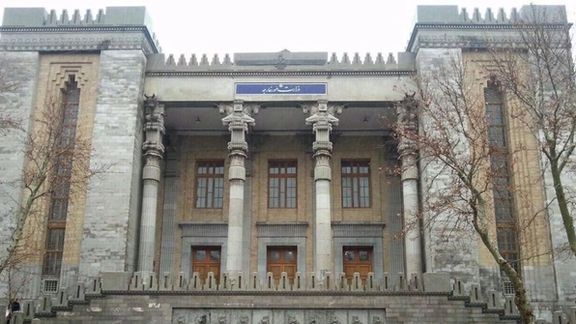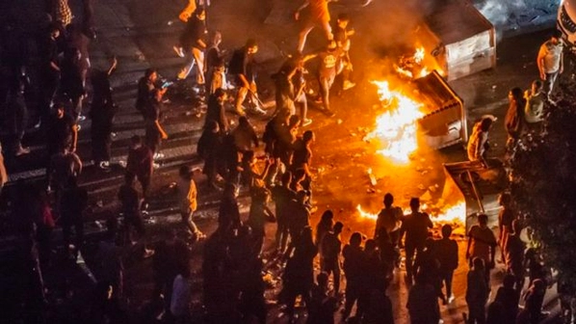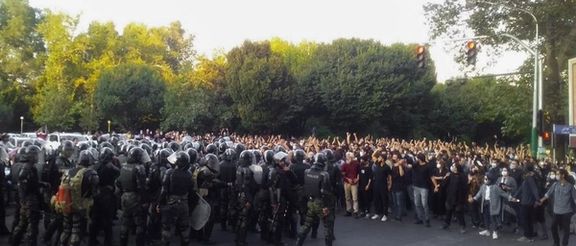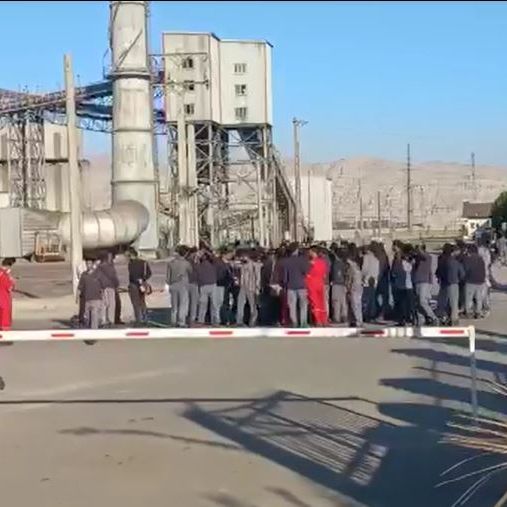Envoy In Tehran Summoned Over French Resolution

Iran has summoned the French ambassador to Tehran over comments made by the country’s foreign minister in the National Assembly against the Islamic Republic.

Iran has summoned the French ambassador to Tehran over comments made by the country’s foreign minister in the National Assembly against the Islamic Republic.
Nicolas Roche was summoned on Wednesday to Iran’s Foreign Ministry over what Tehran calls “unacceptable” remarks by Catherine Colonna which led to approval of a resolution in the assembly on human rights in Iran.
Iran says, “the instrumental and dual use of human rights by France and some other European countries causes great regret to the Islamic Republic Iran.”
Tehran also said these countries “lack the legitimacy to raise such human rights claims.”
On Monday, the French National Assembly unanimously adopted a resolution offering "support for the Iranian people" and condemning the restriction of women's freedoms and rights. This comes ahead of another meeting of EU foreign ministers to discuss new sanctions over Iran’s crackdown on protesters.
President Emmanuel Macron's Renaissance party deputy Hadrien Ghomi, himself a descendant of Iranian immigrants, said the 149 votes in favor of the motion in the National Assembly "sent a strong message" to the world. The resolution condemns in the "strongest terms the brutal and widespread repression" against "non-violent demonstrators".
Foreign minister Colonna said the situation "requires action, with responsibility", adding that after two packages of sanctions already imposed at a European level, new sanctions are being prepared for the next Council of Foreign Ministers on 12 December.
Iran constantly accuses the West of double standards and meddling in its domestic affairs but continues to use deadly violence against protesters.

One person was killed when security forces in Iran attacked people who were out on streets celebrating the elimination of Iran’s soccer team that is seen as siding with the regime.
As it was expected by many Iranians before Team Melli’s match against the US in Qatar, regime agents were prepared for two scenarios. They would be out on streets in large numbers to celebrate if the team had managed to qualify for the knockout stage, and they were ordered to crack down on people who were cheering for the loss of the team, which they regard as the representatives of the theocratic regime and not the nation.
People in many cities poured into streets dancing, honking and chanting antigovernment slogans when security agents attacked them with batons and in some cases opened fire at them. In the northern city of Bandaranzali, the agents opened fire at the cars that were honking, injuring several people. A 27-year-old man, identified as Mehran Samak, was hit in the head with a bullet and died at the hospital.

According to videos on social media, security forces also opened fire at people in the cities of Zahedan and Iranshahr in Sistan-Baluchestan province, Izeh, Behbahan and Dezful in Khuzestan, and Kashan.
In neighborhoods around the capital Tehran and several other cities such as Qazvin and karaj, security forces attacked people with batons and beat them violently before making arrests. There are also photos of car windows broken by bullets.
There were other locations, especially in Kurdish-majority cities, where crowds celebrating the loss of the team were so large that security forces did not dare interfere. People in Kurdish cities of Sanandaj, Marivan, Mahabad, Bukan, Paveh, Ravansar and Kermanshah held large gatherings and in some cases clashed with security forces. In Kamyaran, people are seen setting fire to a government building.
The religious cities of Mashhad and Qom were also scenes of people hugging and congratulating each other for the perceived humiliation of the Islamic Republic, which had heavily invested in the World Cup in Qatar to use it as a public victory.
The regime had given thousands of tickets to its supporters to populate the stadiums with symbols and flags of the clerical regime. Qatar was even cooperating so much that its police stopped anyone who wanted to enter the stadiums with flags and signs opposing the Iranian government.
The Qatari police also prevented any symbol in support of the protests from entering the venues of the tourney. They would not let Iranian fans carry placards with the name or photos of dead protesters. Police prevented people bringing signs supporting women or mentioning Mahsa Amini, whose death in police custody marked the beginning of the current wave of antigovernment rallies. However, they had no problem with the Islamic Republic’s supporters carrying photos of slain IRGC commander Qassem Soleimani, someone designated as a terrorist before his targeted killing by the United States in 2020.
Emboldened by their presence in large numbers at stadiums, regime supporters even attacked Iranians who were chanting antigovernment slogans or carrying placards with the motto of the protests – woman, life, freedom -- outside the stadiums. The Qatari police just stood by without interfering as the regime supporters attacked and beat other Iranians. The only thing they did was confiscate the camera of a foreign journalist who was recording the fight.
In another video, a couple, wearing t-shirts with the motto, is seen after being injured by the pro-regime Iranians as they are upset that security forces did not stop their fight with the regime supporters.

A secret report by IRGC's media arm quotes Iran’s Supreme Leader as saying protests will not end soon and criticizing failures in “media war” against protesters.
“We are in a war and one of the tools to use in this war is the media. Why are we slow in this? Emphasize to these gentlemen (security officials) to utilize the media tool appropriately. These things, the riots, are not to finish anytime soon,” Supreme Leader Ali Khamenei told security and intelligence officials according to the report.
The 123-page document a copy of which has been provided to Iran International is among the documents obtained by the hacktivist group Black Reward. The document which includes both hearsay and excerpts from domestic and foreign-based Persian media was made in one copy only for the eyes of the IRGC chief commander Hossein Salami.
The report says Khamenei also ordered security and intelligence bodies to issue a statement about the ongoing protests that have engulfed the country since mid-September following the death of the 22-year-old Mahsa (Jina) Amini in the custody of morality police.
Although it is no secret that the 83-year-old ruler makes all the important decisions in the country, but this document clearly shows the extent to which tries to micro-manage and interfere in political security-related issues.
Black Reward announced on Friday [Nov. 25] that it had attacked the database of Fars News Agency claiming that it has deleted nearly 250 terabytes of data from all the servers and computers of the website and obtained confidential bulletins sent by the news agency to the office of Supreme Leader Ali Khamenei.
The report also includes various officials’ quotations from Khamenei regarding the recent crisis in the Sunni majority southeastern Sistan-Baluchestan province. The report claims that Khamenei has been critical of authorities for their handling of the situation, especially for President Ebrahim Raisi and Secretary of the Supreme National Security Council (SNSC) Ali Shamkhani’s “lack of initiative” in the matter.
On September 31, security forces killed nearly a hundred Sunni protesters and bystanders after a Friday prayer led by the influential Sunni cleric Mowlavi Abdolhamid who is officially known as Sheikh Abdolhamid Esmail-Zehi.
Protests in the province have continued since the incident which has been dubbed as the “Bloody Friday”. Abdolhamid has directly criticized Khamenei, demanded an apology as well as punishment for those responsible for the bloodshed. He has also defiantly refused to tone down his Friday sermons after which the locals take to the streets every week in the provincial capital, Zahedan, and other cities.
Faced with such “lack of initiative”, the report says, Khamenei told the officials of his own office he would have to take the matters into his own hands if “they could not keep up with it”. He also ordered the SNSC not to arrest Abdolhamid as they suggested by some but “disgrace him” in the eyes of the public while criticizing the police for not apologizing to the public and the people of Zahedan for the incident.
This shows Khamenei plays a major role in decisions that lead to the violation of human rights and the secret operations of intelligence agencies against dissidents.
“The system’s general policy is to bear with Abdolhamid for the time being and avoid provoking him to call Sunnis to the streets again. But the decision is to gradually reduce his influence,” the report’s writer comments in reference to Khamenei’s views.
The report also quotes Gholam-Ali Haddad-Adel, one of Khamenei’s advisors, as saying at a meeting with other officials that Khamenei is critical of the coalition of conservatives and hardliners known as Principlists for “being absent” in the handling of the crisis.
“Where were your forces during this recent unrest? Your [presence] should have shown in the provinces if you were strong and united,” Khamenei said according to Haddad-Adel, a former speaker who is also his son’s father-in-law.

A leaked audio file seems to prove that Iran's protest movement has gained so much ground that authorities can no longer deny its gravity or hide their despondency.
In a speech to the Revolutionary Guards’ Basiji militia members Saturday, Supreme Leader Ali Khamenei, who had so far not acknowledged the serious challenge the protest movement poses to his rule, confirmed his fears by trying to boost the morale of his loyalists and exhorted them “never to lose hope under any circumstances.”
Khamenei also told the chief of police recently, “Don’t let your morale drop,” according to the leaked audio file of a recent insiders’ meeting focusing on the protests.
Regime propaganda is increasingly proving inept and easy to counter and disprove by the popular opposition whose only platform for expression is social media. The said audio file seems to confirm that protesters have gained the upper hand in what the speaker, deputy commander of the paramilitary Basij Qasem Qoreyshi, refers to as “media war”.
The state had banked, for instance, on World Cup football victories to cast a normal, happy image of the society, but last week when the state media tried to make the win against Wales into a big celebration, many chose to follow the social media campaigns to disown the national team and stayed home even in areas where past celebrations were always the biggest. Photos of riot police cheering in their full gear and parading on their motorbikes in the streets served as proof of the point that the team represented “them”, not “us”, many said.

Authorities have waged a campaign of disinformation for years and a host of fake accounts to counter opponents’ social media activities and campaigns, to sow discord among them, and to spy on them. This tactic succeeded somehow at first, but it seems that they’ve been found out and some fake accounts are now being more carefully considered. Many are quickly losing followers they had managed to lure with content that sometimes looked the most aggressive against the regime.
Facts also seem to have become more and more difficult to hide and distort as individuals and families are taking strength from the growth of the movement. The public eventually finds out every time when other citizens are killed, injured, or arrested, and do not believe when the authorities deny responsibility.
Nearly 450 protesters have been killed but the state not only has not taken responsibility for even one case, but has also cast the blame on others, even protesters themselves. Such incidents have only resulted in greater anger among citizens and more power to the protest movement.
The outbreak of unrest could have been possibly prevented if the death of the 22-year-old Mahsa Amini which sparked the protests could have been hidden from the public. But her family refused to remain silent.
As a result, few believe the official account when Atefeh Na’ami, 37, was found a few days ago in the balcony of her apartment under a blanket with a gas pipe near her mouth.
Authorities say she committed suicide but her family who calls the regime and its officials “occupiers” insist she “gave her life for freedom”. According to her brother, security forces buried her quietly with only a few female members of the family present.
The grievances of the Iranian public are not limited to lack of freedom or social issues, as the slogans chanted by protesters may suggest. What probably causes the greatest concern to the authorities is that protests have not yet become as extensive in impoverished areas where the 2019 deadly protests were the most intense.
In the leaked audio file one of the participants in the meeting quotes the secretary of the supreme national security council, Ali Shamkhani, as saying that 70 percent of Iranians believe their living conditions are fast deteriorating.

The US football team scored one goal in the first half of the most politicized match of the Qatar World Cup, defeating Iran and qualifying for the next round.
The Iranian national soccer team once again sang along with the Islamic Republic’s anthem before the match against the US team, a gesture that will further discredit them in the eyes of Iranians opposed to the ruling theocracy.
Many Iranians have been urging members of the team to show solidarity with people who have been protesting against the regime since mid-September following the death in custody of Mahsa Amini, and sided with the Islamic Republic.
Both US and Iran fans were electrified in the stadium, but the American team won a fast and tense game and will the Netherlands on Saturday, December 3.
Following the loss, people poured onto streets in Iranian cities and held celebrations, chanting antigovernment slogans.
The capital Tehran and the nearby city of Karaj, Orumiyeh (Urmia) and Ardabil in the northwest, Dezful and Ahvaz in the southwestern province of Khuzestan, and northern cities of Lahijan and Rasht as well the southern city of Kish and central cities of Zanjan held gatherings, expressing satisfaction that its team failed to use the World Cup as an opportunity to promote regime propaganda. Security forces reportedly attacked the people in the capital Tehran who were out celebrating the team’s loss.
People in Kurdish cities of Sanandaj, Marivan, Mahabad, Javanroud, and Saqqez – the birthplace of Mahsa Amini, whose death in police custody ignited the protests – held celebratory rallies on streets in support of the protests.
Along with many Iranians who are fed up with the regime’s brutalities and are relieved that the team has been eliminated from the World Cup, US President Joe Biden was also happy after the match.
Before the match, a group of American fans were seen chanting, "Women, Life, Freedom," the motto of protesters in Iran after Mahsa Amini was killed in 'hijab police' custody in September.
Singing the so-called national anthem is a key moment for Iranians because it is a symbol of support for the Islamic Republic, which has been using deadly violence against the people for the past 70 days. Like the two earlier matches, the stadium was full of pro-government fans, many of whom were given free tickets and travel expenses to cheer for the Islamic Republic during the game.
The players remained silent during their opener against England but after the match, people’s reactions on social media and streets indicated that the gesture was not enough to elicit forgiveness for the players, who have lost popularity due to their lack of support for the popular protests. In their second match, the players sang along with the anthem and even celebrated boisterously after scoring goals and winning the match, setting the ground for the world to witness a rift in Iranian society.

Earlier in the day, US Secretary of State Antony Blinken played down any link between the match and political tensions, expressing hope that the game would "speak for itself."
The national team players, whether they have been threatened to distance themselves from the protests or have opted to stay on the regime's side, no longer represent many of their countrymen. The Iranian squad – nicknamed Team Melli -- needs at least a draw to book a berth for the knockout stage but the Yanks must defeat Iran if they want to keep their hopes alive in the competitions.


Team Melli 0 - 1 Stars and Stripes
Iranians showed a dull performance in the first half, conceding one goal while they were very lucky that the Americans did not score more.
Videos have already emerged on social media of Iranians celebrating after Christian Pulisic scored the opener for the US.
Iran won its previous match against 10-man Wales 2-0 after its humiliating 6-2 loss against England. The Americans, however, displayed a stable performance in their two earlier matches that ended with a goalless draw against England and a 1-1 tie with Wales.
Citing a source involved in the security of the games, CNN reported Monday that even the families of Team Melli players have been threatened with imprisonment and torture if the players fail to “behave” ahead of the match against the USA. The source added that the players were called to a meeting with members of the Revolutionary Guard (IRGC), saying that they were told their families would face “violence and torture” if they did not sing the anthem or if they show any act of protest against the Tehran regime.
Qatar, which has strong ties with Washington and friendly relations with Tehran, has staked its reputation on delivering a smooth World Cup, beefing up security at Iran games and banning items that are used to express solidarity with the antigovernment protests, like Iran's ancient sun and lion flag.

Iranian factory workers, truck drivers and nurses have continued the new wave of nationwide strikes as part of the antigovernment protest movement.
In the third month of the uprising against the Islamic Republic, a new round of strikes has begun in industrial, service, oil and gas sectors.
The organizers of protests said on social media that the workers at oil and gas sector have announced readiness to go on strike at different phases of Kangan and Asaluyeh fields in the Persian Gulf region.
Meanwhile, the employees of Madkoush Pelletizing Company in Bandar Abbas in southern Iran also held a gathering and stopped work to protest inattention to their demands.
Workers at Safe Khodro Car Manufacturing Company as well as drivers and truckers continued their strikes on Tuesday.
Reports from the cities of Shiraz, Esfahan, Sanandaj, Bandar Abbas, etc. show that the drivers are keeping up with their pledge to hold a ten-day strike to cripple the transportation system.
A video received by Iran International shows that a group of nurses at Imam Khomeini Hospital in Tehran stopped working and gathered chanting slogans to claim their rights.
In the meantime, the Oslo-based Human Rights Organization said the number of people killed during anti-government protests in Iran has risen to 448 including 60 children and 29 women.
“In the last week alone, more than 16 people were killed by repressive forces in Iran. Of those, 12 were killed in Kurdish areas,” noted the organization.